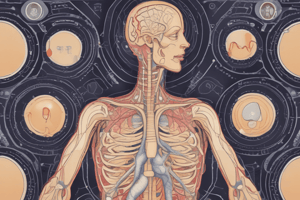Podcast
Questions and Answers
Which hormone is responsible for secretion of Growth Hormone (GH)?
Which hormone is responsible for secretion of Growth Hormone (GH)?
- Somatostatin
- Oxytocin
- GHRF (correct)
- Adrenocorticotropic hormone (ACTH)
What does TSH stand for?
What does TSH stand for?
- Testosterone Stimulating Hormone
- Tuberculosis Stimulating Hormone
- Thrombin Stimulating Hormone
- Thyroid Stimulating Hormone (correct)
ACTH is responsible for stimulating the adrenal cortex.
ACTH is responsible for stimulating the adrenal cortex.
True (A)
What hormone is responsible for milk production?
What hormone is responsible for milk production?
Low levels of insulin can lead to diabetes mellitus.
Low levels of insulin can lead to diabetes mellitus.
Match the following hormones to their functions:
Match the following hormones to their functions:
What hormone is secreted by the pineal gland?
What hormone is secreted by the pineal gland?
What condition is caused by low Growth Hormone in childhood?
What condition is caused by low Growth Hormone in childhood?
Which hormone is responsible for increases in blood pressure, heart rate, and blood glucose?
Which hormone is responsible for increases in blood pressure, heart rate, and blood glucose?
The hormone _____ stimulates follicle growth.
The hormone _____ stimulates follicle growth.
Which condition is associated with high levels of cortisol?
Which condition is associated with high levels of cortisol?
What is the primary function of Calcitonin?
What is the primary function of Calcitonin?
What hormone is released by the adrenal gland that affects sex characteristics?
What hormone is released by the adrenal gland that affects sex characteristics?
Flashcards are hidden until you start studying
Study Notes
Hormones and Their Functions
-
Hypothalamus Hormones:
- GHRF: Stimulates secretion of growth hormone (GH).
- Somatostatin: Inhibits secretion of GH.
- Thyrotropin-releasing factor (TRF): Stimulates secretion of thyroid-stimulating hormone (TSH).
- Corticotropin-releasing factor (CRF): Stimulates secretion of TSH.
- Prolactin-inhibiting factor (PIF): Inhibits prolactin secretion.
- Gonadotropin-releasing hormone (GnRH): Stimulates secretion of follicle-stimulating hormone (FSH) and luteinizing hormone (LH).
-
Pituitary Gland Hormones:
- TSH: Stimulates thyroid gland and regulates cell proliferation.
- ACTH: Stimulates adrenal cortex.
- FSH: Promotes follicle growth.
- LH: Induces ovulation and testosterone release (interstitial cell-stimulating hormone, ICSH).
- GH: Supports cell growth, division, metabolism, and protein synthesis; disorders include dwarfism (low GH), gigantism (high GH in childhood), and acromegaly (high GH in adults).
- Prolactin (LTH): Stimulates lactation and breast development.
- MSH: Promotes melanin production.
- ADH (Vasopressin): Aids water reabsorption, increases blood volume, and blood pressure; deficiency leads to diabetes insipidus.
- Oxytocin: Triggers labor and lactation; excessive levels can lead to complications such as uterine wall rupture.
Glandular Hormones and Disorders
-
Pineal Gland:
- Melatonin: Regulates biological clock, sleep cycles, and gonadal development.
-
Thyroid Gland:
- T3 and T4: Crucial for maintaining basal metabolic rate (BMR), glucose metabolism, and overall physical growth; disorders include hyperthyroidism (high levels), hypothyroidism (low levels), and developmental disorders like cretinism (children) and myxedema (adults).
- Calcitonin: Lowers blood calcium levels; dysfunction can lead to hypercalcemia or hypocalcemia.
-
Parathyroid Gland:
- Parathyroid hormone (PTH): Increases blood calcium levels; disorders include hypercalcemia (excess PTH) and hypocalcemia (insufficient PTH).
-
Thymus Gland:
- Thymosin: Facilitates maturation of T-lymphocytes (white blood cells).
-
Pancreas:
- Insulin: Lowers blood sugar levels; insufficient insulin results in diabetes mellitus.
- Glucagon: Increases blood sugar levels; low glucagon can lead to hypoglycemia.
-
Adrenal Gland:
- Epinephrine and norepinephrine: Enhance heart rate, blood pressure, and glucose levels; can cause hypertension and aggressive behavior when elevated.
- Aldosterone: Promotes reabsorption of sodium and chloride.
- Androgens: Influence secondary sexual characteristics; excess can cause masculinization in females.
- Cortisol: Reduces inflammation and pain, aids glycogen metabolism; disorders include Addison’s disease (low cortisol) and Cushing syndrome (high cortisol).
-
Ovaries:
- Estrogen: Promotes secondary sexual characteristics; low levels can lead to sterility and high levels are associated with fibroids and polycystic ovaries.
- Progesterone: Prevents ovulation and maintains pregnancy; low levels can trigger early menstruation and increase miscarriage risk.
-
Testes:
- Testosterone: Essential for male reproductive organ development, secondary sexual traits, libido, and normal sperm production; deficiencies lead to feminine characteristics and male sterility.
Kidneys
- Renin: Monitors blood pressure.
- Calcitriol: Increases intestinal absorption of calcium.
- Erythropoietin (EPO): Stimulates red blood cell production in response to low oxygen levels or bleeding.
Studying That Suits You
Use AI to generate personalized quizzes and flashcards to suit your learning preferences.




